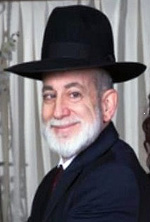To Free, You Must Be Free
By Rabbi Yaakov Marks

SAN DIEGO — Moshe is one of the most selfless leaders to ever guide a nation. As a young man being raised in the palace of Pharaoh surrounded by luxury and the choicest material pleasures the world had to offer, Moshe would daily walk out among the slaves to try to better their plight.
He gave up the comfort and serenity of the palace to walk in and feel the pain of the cold harsh world of his brothers’ slavery. Once, when a slave was being wrongly mistreated Moshe, without hesitation, put his life in danger to protect him. Because this Moshe needed to escape into the wilderness with nothing but the clothes he was wearing and he never complained.
In Midyan Moshe risked his life to help seven young women who were being harassed by a group of aggressive shepherds. As a shepherd for his father in law, Yitro, Moshe endured unknown hardships to properly do his job. Moshe never showed any need of placing his physical comfort before his performing of a necessary task. Even at the end of his life when his death was conditional on the completion of a commandment, Moshe performed the commandment without hesitation.
G-d appears to Moshe and informs him that he has been chosen to redeem and lead the Jewish Nation. Moshe humbly agrees after much debate to take the job even though he felt there were better people than him who should have the position. Again, we see Moshe’s love of other people. He was willing to be forgotten in history so someone else could have the honor.
Moshe gathers his family and sets off on his journey to return to Egypt to free his people. Zipporah, his wife, had just given birth but was willing to go with their newborn baby before his circumcision to witness G-d’s revelation in Egypt. As the group nears Egypt, Moshe starts to set them up in an inn and a horrifying event takes place, an angel appears and tries to take Moshe’s life. Zipporah senses the problem and quickly circumcises her son and Moshe’s life is spared. Why did this incident take place? What did Moshe do that was so terrible that would warrant his death?
The Talmud (Nadarim 31b) tells us that the answer is found in the wording of the Torah. “and he (Moshe) was on the way in an inn” (Shemot 4:24). Why does the Torah have to add “in an inn”? The Rabbis learn that it is teaching us that Moshe went about setting himself up in the inn before performing the commandment of circumcising his son. After the long journey, Moshe rationalized that he needed to first get settled and set up a meal to properly honor the performance of his son’s circumcision. Rabbi Bezalel Ashkenazi in his book the Shita Mekubetset states that Moshe was punished because he got involved in his physical needs before taking care of his spiritual needs.
Moshe allowed a momentary desire for pleasure, to temporarily cloud his thinking, he became focused on physical pleasure, which severed his connection with G-d. At that moment, he allowed his desire to guide him and in that state of mind he was not fit to be a leader and on his spiritual level, he was punishable with death. Once Zipporah performed the circumcision Moshe regained his composure and never made that mistake again.
If Moshe, who was constantly connected to G-d and always had other people’s needs in mind before his own needs could make a mistake and consider his desire for pleasure to be a Mitzvah all the more so we nowadays need to be very careful. We need to be very discerning of our behavior. For example, at the Shabbos table when an abundance of food is put before us and we eat more than we physically need and we claim it’s a Mitzvah to have enjoyment on Shabbat and continue eating. Are we being motivated because it is a Mitzvah to over eat on Shabbat or is our desire to have pleasure making us declare that we are doing a Mitzvah? Moshe is telling us that it might be difficult sometimes to realize our motivation, but if we don’t take control G-d might have to do something drastic to get our attention.
May we be blessed with the wisdom and understanding to identify when our desire for physical pleasure is attempting to motivate us. May we merit to have the strength and honesty to control our desires so that we will be constantly acting appropriately. May G-d grant us this genuine freedom.
*
Rabbi Marks is a life and health coach, who may be contacted via ahealthyrabbi@gmail.com.